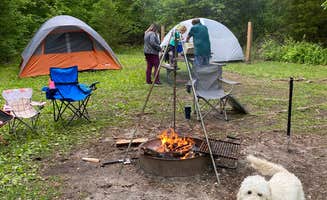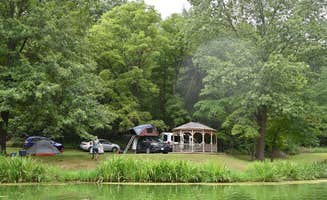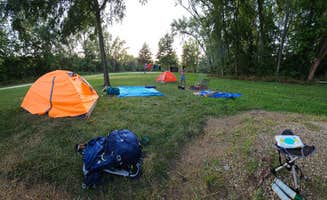Tent camping near Lake St. Louis, Missouri offers several options within a 30-60 minute drive radius. The area sits at approximately 500-600 feet above sea level in Missouri's eastern region where the terrain varies from rolling hills to river valleys along the Missouri and Mississippi Rivers. During summer months, tent campers can expect high humidity with temperatures regularly reaching 85-95°F during July and August.
What to do
Hiking technical trails: At St. Charles County Klondike Park, campers can explore multiple terrain types within one park. One reviewer noted, "Trails are beautiful and perfect for families wanting to just come to a park for a day and hikers."
Water activities: The small lake at McCully Heritage Project offers fishing and paddling opportunities. A camper mentioned, "We easily fit a dozen people over the 4th of July. Nice hiking trails near. Super inexpensive for the space that you get. Free firewood."
River access: The Gasconade River at Fredericksburg Ferry Access provides swimming and fishing. A reviewer cautions about water conditions: "The swim there requires crossing a moderately sized river that is relatively swift. This is fine for people who swim well but not recommended for young children or weak swimmers especially without flotation devices."
What campers like
Budget-friendly options: Little Lost Creek Conservation Area offers free camping but requires complete self-sufficiency. A camper explains: "There are single campsites on both the north and south ends of the conservation area, and none of them have any amenities- no water, no vault toilet or outhouse, no firewood for sale. But what the sites are lacking is made up for with scenery and hiking."
Privacy between sites: Some campgrounds offer more secluded spots than others. At Dr. Edmund A. Babler Memorial State Park, certain areas provide more seclusion: "Sites 52-75 are much more treed and have a private feel to them. It seems this is where most of the tent campers like to be."
Location near wineries: Tent camping at Klondike Park puts you in Missouri wine country. A camper noted, "This Campground places you in the heart of Missouri Wine Country and there's a perfect base for visiting the wineries and restaurants along highway 94."
What you should know
Wildlife considerations: Beyond raccoons at Babler, many areas have active wildlife. At McCully Heritage Project, a camper advises: "Watch for ticks. Don't be alarmed if you see cats or the neighbors dogs roaming around the site. They are friendly."
Limited facilities: At William R. Logan Conservation Area, expect minimal amenities. A reviewer shares: "The only vault toilet was closed and a porta potty was set next to that. There is also a lollipop loop with some really primitive and obviously rarely used campsites in the woods."
Seasonal bathroom availability: Many parks reduce services during winter months. A camper at Klondike Park noted: "The shower house wash disappointingly dirty for as new as it was, but it was a busy holiday weekend."
Tips for camping with families
Consider site location: At Klondike Park, sites vary in distance from facilities. One camper shared: "Last time we were in spot 22. 22 is a long ways from the bathroom and parking lot." Choosing closer sites benefits families with young children.
Check for playgrounds: Some parks offer child-friendly recreation areas. A visitor to McCully Heritage Project noted: "We had a picnic and the kids got to play on the playground equipment. I just love the bridge across the pond."
Evaluate hiking difficulty: Trail difficulty varies between parks. At Old Cove, families can enjoy float trips: "For float trips they pick you up from your campsite and bus you to your put in point. You can float the Meramec for 4 or 9 miles and you end back at the campsite."
Tips from RVers
Site length considerations: RV sites vary in accessibility. A Babler State Park reviewer advises: "Not all sites are long enough for large RVs and the roads in some loops prevent you from turning around. The camp hosts we encountered are very helpful and have a list of site lengths and can tell you which ones are appropriate for large RVs."
Limited hookups: Most campgrounds offer electric-only hookups or no hookups. A camper at Babler State Park shared: "What we liked about this campground was the comfortable feel of being at a state park with plenty of trees, hiking trails, space between sites, but also the convenience of having a level, paved site with electricity and television/phone reception."
Off-grid preparation: RVers should plan for limited services. Near Lake St. Louis, most tent camping areas require self-sufficiency with water and waste management. Dump stations are uncommon except at larger established parks.




